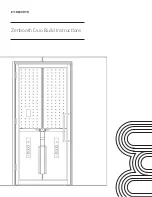
USE AND MAINTENANCE
ENGLISH
cod. G19502563
70
4.0 OPERATIONS FOR PUTTING THE MACHINE
INTO SERVICE
4.1 WHEN THE MACHINE IS NEW
- Assemble onto the equipment any parts that may have been delivered
disassembled for transport purposes (follow the instructions given
in the assembly diagrams attached to these parts).
4.2 CHECKS AND PREVENTATIVE MAINTENANCE
- Check that the safety bolts are present on the pins:
a)
3-point linkage connecting pins;
b)
pins for locking the row marker arms for road transport.
- Check that the pipes of the hydraulic system are undamaged.
- Check that all the screws are tight.
- Grease the universal joint spiders.
- Grease the row-marker disc pin.
- Grease the pin of the seeding depth control wheels.
- Check that all the suction tubes are well connected.
-
Check that all the drive shafts are properly engaged.
-
Carefully check moving parts, dri-ving parts and seed distribution.
4.3 ATTACHMENT THE TRACTOR
- Connect the equipment to the third point of the tractor using the
safety devices.
- Connect the cardan shaft.
- Connect the hydraulic pipes to the distributors of the tractor.
- Plug the visual signalling units into the socket of the tractor's
electrical system.
- Remove the safety bolts of the row marker arms and the toolbar,
and operate the hydraulic systems to check they are working
correctly. If necessary, adjust the flow regulators where present.
- Lift the equipment off the ground and remove the support legs (Fig.
49).
- When travelling by road, lock the row marker arms and the toolbar
in transport position with the safety bolts.
4.4 PREPARING FOR SEEDING
- From the seed chart, according to the row spacing, obtain the
distance between one seed and the next along the row.
- From the longitudinal sowing distance adjustment table, obtain
the combinations of gears on the gearbox and on the drive wheel
that will produce this distance.
- Insert the right seed discs in the distributors.
- If beet seed is to be distributed, use the seed ejector. In other
cases, remove the ejector.
- Put a small quantity of seed in the hoppers.
- From the driverís seat of the tractor, raise the seeder;
- Operate the power take-off at 540 rpm;
- Using the gear lever, put the tractor engine into neutral;
- Brake the tractor and if necessary, secure it with wooden blocks
sized according to the size of the wheels;
- Manually turn the seeder gear drive wheel in the direction in which
the machine is moving;
- Adjust the selector and control through the grate that the plate is
only holding one seed per hole;
- Adjust the planting depth by turning the side wheels by means of
the handle.
- According to the type of ground, adjust the distance of the rear
wheels and their pressure on the ground for closing the seed
furrow.
- Check the degree of preparation of the seedbed and adjust the
height of the front clod clearer.
- Move along the seedbed for a few metres with the equipment in
working position, and adjust the third point tie rod to obtain true
perpendicularity between machine and ground.
- Start sowing: after a few metres check whether the distributors are
correctly dropping one seed at a time.
6.5 DISTRIBUTION OF CHEMICAL PRODUCTS
- Hoppers and tanks can be filled by hand or using a lifter with a
capacity of at least 200 kg, which must be regularly approved by
the relative authorities.
- When filling the fertilizer and insecticide hoppers, be careful
that foreign bodies do not enter (string, bag paper, etc.).
- Set the quantity to distribute following the information given in
the table (the values given in the table are a rough guide only).
- Adjust the working depth and the distance of the fertilizer
placement units from the sowing row, carefully following the
specific agronomic instructions of each crop.
fig. 49
fig. 50










































